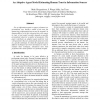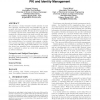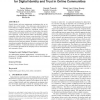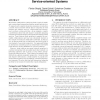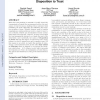IAT
2009
IEEE
15 years 9 months ago
2009
IEEE
For an information agent to support a human in a personalized way, having a model of the trust the human has in information sources may be essential. As humans differ a lot in the...
131
click to vote
CSFW
2009
IEEE
15 years 9 months ago
2009
IEEE
We consider using trust information to improve the anonymity provided by onion-routing networks. In particular, we introduce a model of trust in network nodes and use it to design...
106
click to vote
CSE
2009
IEEE
15 years 9 months ago
2009
IEEE
—The success of a Public Key Infrastructure such as the Web of Trust (WoT) heavily depends on its ability to ensure that public keys are used by their legitimate owners, thereby ...
149
click to vote
IDTRUST
2009
ACM
15 years 9 months ago
2009
ACM
We introduce a formal semantics based calculus of trust that explicitly represents trust and quantifies the risk associated with trust in public key infrastructure (PKI) and iden...
143
click to vote
IEEEARES
2009
IEEE
15 years 9 months ago
2009
IEEE
— Trust in software services is a key prerequisite for the success and wide adoption of Services-Oriented Computing (SOC) in an open Internet world. However, trust is poorly asse...
134
click to vote
AINA
2009
IEEE
15 years 9 months ago
2009
IEEE
In this paper we reinforce the benefits of a trust based approach in mobile multi-agent systems. Whilst we do not specify a trust model we provide a framework for property based ...
128
click to vote
CCS
2010
ACM
15 years 9 months ago
2010
ACM
Digital identity and trust management mechanisms play an important role on the Internet. They help users make decisions on trustworthiness of digital identities in online communit...
129
click to vote
SAC
2010
ACM
15 years 9 months ago
2010
ACM
Web-based collaboration systems typically require dynamic and context-based interactions between people and services. To support such complex interaction scenarios, we introduce a...
137
click to vote
SAC
2010
ACM
15 years 9 months ago
2010
ACM
While the trust paradigm is essential to broadly extend the communication between the environment’s actors, the evaluation of trust becomes a challenge when confronted with init...
